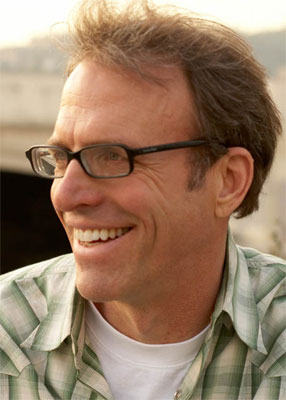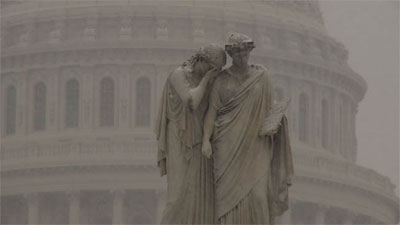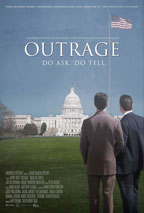Kirby Dick Outrage Interview

KIRBY DICK opens a political closet.
EXCLUSIVE Kirby Dick, Outrage Interview by Paul FischerKirby Dick knows how to push the buttons of those whose buttons don't want to be pushed, from the highly secretive MPAA in his provocative This Film is not Yet Rated, to closeted gay politicians whose hypocrisies are rampant in Dick's latest film, Outrage. The acclaimed director takes no prisoners as this film exposes the hypocritical, anti-gay voting records of closeted gay politicians. Perhaps now, given the new American Federalism, the timing for Dick's film is perfect. PAUL FISCHER spoke to him in this exclusive interview.
QUESTION: Was there a particular incident that inspired you to set about to do this? I mean, was there one particular personality, one particular -
KIRBY DICK: Not really. I got the idea about two months before the whole Mark Foley scandal, and a year before the revelation about Larry Craig. I was in DC, and was thinking, "There must be some great stories here." I was promoting my last film, This Film is Not Yet Rated. And I started asking around. I mean, the first thing that came up, just in kind of casual conversation - "Well, Karl Rove is gay." And I kind of whipped around, like, "What?" Now, there's no proof that he is. But that led to a discussion about how many other closeted politicians there were, how many of these were voting anti-gay. And then the fact that the mainstream media was not covering this. And it just seemed like very rich territory for a documentary.
QUESTION: Now, a cynic might argue, I suppose, that you must have put your hands up in glee when the whole Craig thing came out. I mean, was a part of you sort of grateful for that? Not grateful. But, was it added fodder, I suppose, for your film?
KIRBY DICK: Yes, I think so. I mean, from that perspective. I mean, I was aware of the rumors about Larry Craig, already. And Mike Rogers is in my film, and actually outed him nine months before. The whole revelation came about. And, of course, people didn't believe him. I did, because I'd talked to Mike, and I knew what information he had. I mean, what Mike had - what's pretty interesting is, he had talked to someone who had had sex with Larry Craig in a Union Station bathroom. A totally different bathroom. Which was, by the way, three blocks from the Capitol. So - you know, the end result of this is, Mike was vindicated, and all the people who had sort of claimed that he was just grandstanding were proven wrong.
QUESTION: How surprised were you that you were able to get access to some of the outed politicians? And also, some of the - you know, Barney Frank, for example, was very open with you.
KIRBY DICK: Yeah. Well, I mean, that's sort of - my producer, Amy Ziering, is very skilled at presenting what the film was, and encouraging people to participate. I mean, people were initially very wary, because it's DC. And it's a very buttoned-down town. But a lot of people, once they realized that it was going to be a film with integrity, and a very important film, we were slowly able to kind of work our way through the corridors of power.
QUESTION: How much attention have you received from politicians about this film? Either positive, or incredibly negative?
KIRBY DICK: Well, no negative yet. I mean, we'll wait and see. A lot of DC-particularly a lot of gays and lesbians who are in politics in DC-wanted this story told. Because they knew the personal and political costs of the closet. They had either been in the closet themselves, or all knew people who were deeply in the closet, and saw the personal toll it took on them. And then almost all of them were close to politicians who were closeted, and in order to protect the closet, voted anti-gay. And in so doing, harmed the lives of millions of American citizens. And so they also - these subjects that we interviewed also saw the political costs. And they wanted this film made.
 QUESTION: Was there a narrative through-line that you came up with from the outset? How did you know what the end result was going to be, and who you were ultimately going to end up focusing on because I know that the end of the film focuses on a particular politician, Charlie Crist. Did you think of that at the time?
QUESTION: Was there a narrative through-line that you came up with from the outset? How did you know what the end result was going to be, and who you were ultimately going to end up focusing on because I know that the end of the film focuses on a particular politician, Charlie Crist. Did you think of that at the time? KIRBY DICK: Yeah. Actually, for a long time, I was aware of the rumors about Charlie Crist, but I didn't choose to focus on him, because even though he was supporting the anti-gay adoption position, he was also not coming out strongly in support of Amendment Two. I mean, he was kind of dodging that issue. And I thought, "You know, it doesn't really rise to the level of hypocrisy." But when he did that. When he came out and supported this Amendment that not only forbids same-sex marriage, but it also prevents gays and lesbians from even entering into civil unions - and he did it - you know, from my opinion, just because he was protecting the closet - it was a classic example of hypocrisy. And - I mean, this is a bill that, if he had come out on the other side of, which I fully believe that he is not in support of - you know, he did not want to support Amendment Two. I mean, he's quoted as saying he has a "live and let live" attitude. Amendment Two is anything but "live and let live." But he felt, because he has long time ambitions to run for President, and these rumors had been swirling around, he felt like if he supported Amendment Two, it would - I think wrongfully, but I think people would say, "Well, he's gay. Because - you know, that's proof that he's gay, he's supporting this." So he made this calculated political decision. And - the result of which is, we have an Amendment to the Florida constitution which may be in existence for 20, 30, 40 years. I think this may be the most important legacy of his administration. And it's sad, but it's also an incredible case of hypocrisy.
QUESTION: Do you think he will run for President in '012?
KIRBY DICK: He wants to. There's no question. I mean, he wanted to be Vice President.
QUESTION: Do you think that gay activists will do whatever they can to try and discredit him?
KIRBY DICK: Well, you know, it's not just gay activists. I mean, I think a lot of people are going to be asking very hard questions.
QUESTION: Especially after this movie comes out, presumably.
KIRBY DICK: You know, I think he's kind of boxed himself in a corner by getting married, personally. I think that he's - you know, I think Charlie Crist had the possibility to be the first major and serious candidate for the Presidency, gay, out candidate for the Presidency, that our country has ever had. I think he could have been historic, even if he hadn't won. And the way things are shifting, the way the tide is shifting on even gay marriage now, a majority of the electorate is in support of gay marriage. And it's shifting very rapidly. I think if he had - you know, in 2014 - let's say he's running in 2016, Obama is in for eight years - had come out and said, "Look. You know, I know I haven't been fully honest about this. It's been difficult. But I want to - regardless of my career, come out and say I am a gay American." I think that a lot of people, a lot of Democrats as well, would have said, "Hey. How refreshing, to have a politician speak honestly about something that's so personal to him. I'm gonna vote for him."
QUESTION: Do you think that the current Administration will-- given Obama's views on various other social causes that we know about, there will be some changes to some of the federal anti-gay legislation?
KIRBY DICK: Oh, I think there will be. I just hope it comes fast and furious. I don't think there's any excuse at all for any kind of discrimination toward any citizen in this country. All citizens deserve full civil rights.
QUESTION: Given who we have in the White House, you would think that would be a pretty important issue.
KIRBY DICK: Yes. [LAUGHTER] Exactly. Exactly. So, you know, I feel that that's his sentiment. But Obama's a politician as well. And I think when it comes to civil rights, I think there's a time to put your political strategizing aside, and just do the right thing.
QUESTION: Now, you've made two films that deal, to some extent, with a certain sort of conservativism, in terms of sexuality. I mean, greater in this one. They both have, I think, definite parallels. Is this of interest to you? Do you expect to go in a completely different direction next time around?
KIRBY DICK: It's of interest. I mean, you know, I think that - I like to take on a subject matter that is complex. And whenever you introduce sexuality - and in this case I introduced ethics. The ethics of outing. You introduce politics. You know, you end up with this stew, if you will, that just becomes very fascinating. It's fascinating to work in that arena for two years. It's fascinating to do interviews about it. So - you know, I think sex always is - it adds to the complexity of any subject matter. If it's related. And so - I mean, that's part of the reason I focus on these things.
QUESTION: Do you know what you're doing next?
KIRBY DICK: I do. It's about tearing open another closet door. But I can't let the person who's hiding in that closet, or the people, I should say, know that I'm coming their direction.
QUESTION: Oh, I see! [LAUGHTER] And finally, where do you stand on the ethics of public outing?
KIRBY DICK: Of outing? Well, in my film - you know, I don't see myself as outing gay politicians. Closeted politicians. I see myself as reporting on the hypocrisy of closeted politicians who vote anti-gay. And I think that's not only a right thing to do, I think it's the responsibility of journalists and documentary filmmakers, to report on that. I think it's a responsibility of journalists to report on hypocrisy wherever they see it in elected officials. Now, if somebody's just a private citizen, no. I don't support that. But when we're dealing with this kind of hypocrisy, if you don't report on it, it'll just stay there and continue.

Outrage
Director: Kirby DickFrom Academy Award-nominated documentary filmmaker Kirby Dick (This Film Is Not Yet Rated) comes Outrage, a searing indictment of the hypocrisy of closeted politicians with appalling gay rights... From Academy Award-nominated documentary filmmaker Kirby Dick (This Film Is Not Yet Rated) comes Outrage, a searing indictment of the hypocrisy of closeted politicians with appalling gay rights voting records who actively campaign against the LGBT community they covertly belong to. Boldly revealing the hidden lives of some of the United States' most powerful policymakers, Outragetakes a comprehensive look at the harm they've inflicted on millions of Americans, and examines the media's complicity in keeping their secrets.
With analysis from prominent members of the gay community such as Congressman Barney Frank, former NJ Governor Jim McGreevey, activist Larry Kramer, radio personality Michelangelo Signorile, and openly gay congresswoman Tammy Baldwin (Representative, Wisconsin 2nd district), Outrageprobes deeply into the psychology of this double lifestyle, the ethics of outing closeted politicians, the double standards that the media upholds in its coverage of the sex lives of gay public figures, and much more.
MORE
- Viggo Mortensen The Road
- 24 Cast Reunion
- Aaron Eckhardt No Reservations
- Aaron Eckhart The Dark Knight
- Adam McKay Step Brothers Interview
- Alan Alda Diminished Capacity Interview
- Alan Alda Diminished Capacity Interview
- Alex Dimitriades
- Al Pacino Oceans 13
- Alan Rickman Snow Cake
- Alan Rickman Sweeney Todd



